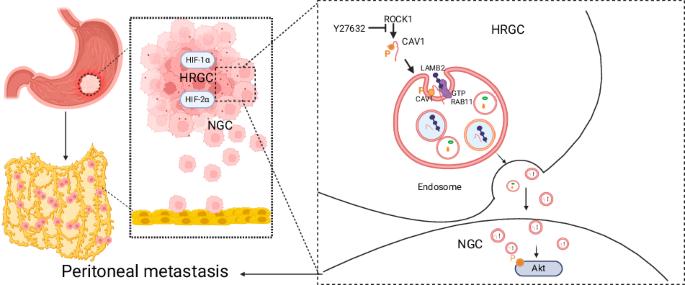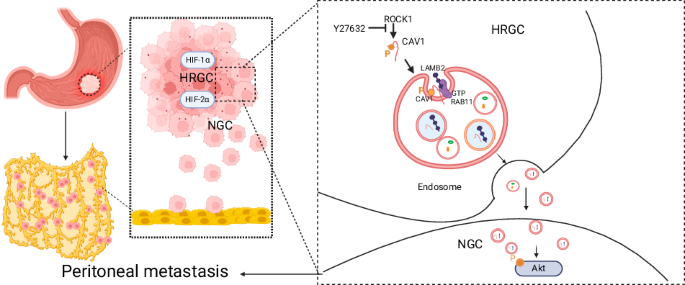Hypoxia-induced LAMB2-enriched extracellular vesicles promote peritoneal metastasis in gastric cancer via the ROCK1-CAV1-Rab11 axis
IF 7.3
1区 医学
Q1 BIOCHEMISTRY & MOLECULAR BIOLOGY
引用次数: 0
Abstract
Peritoneal metastasis is one of the most common risk factors contributing to the poor prognosis of gastric cancer. We previously reported that extracellular vesicles from gastric cancer cells could facilitate peritoneal metastasis. However, their impact on gastric cancer-induced peritoneal metastasis under hypoxic conditions remains unclear. This study aims to elucidate how hypoxia-resistant gastric cancer cell-derived extracellular vesicles affect the peritoneal metastasis of normoxic gastric cancer cells. Proteomic analysis revealed elevated levels of Caveolin1 and Laminin β2 in hypoxia-resistant gastric cancer cells and their corresponding extracellular vesicles. Importantly, Caveolin1 was found to play a central role in mediating Laminin β2 sorting into extracellular vesicles derived from hypoxia-resistant gastric cancer cells, and subsequently, extracellular vesicle-associated Laminin β2 promoted peritoneal metastasis in normoxic gastric cancer cells by activating the AKT pathway. Further investigation confirmed that Caveolin1 activation by Rho-related Coiled-coil kinase 1-mediated phosphorylation of Y14 residue is a key factor facilitating Laminin β2 sorting into extracellular vesicles. Moreover, Y14 phosphorylated- Caveolin1 enhanced Laminin β2 sorting by activating Rab11. Finally, our study demonstrated that a combined assessment of plasma extracellular vesicle-associated Caveolin1 and extracellular vesicle-associated Laminin β2 could provide an accurate predictive tool for peritoneal metastasis occurrence in gastric cancer.


缺氧诱导的LAMB2-富集细胞外囊泡通过ROCK1-CAV1-Rab11轴促进胃癌腹膜转移
腹膜转移是导致胃癌预后不良的最常见风险因素之一。我们曾报道胃癌细胞的胞外囊泡可促进腹膜转移。然而,它们在缺氧条件下对胃癌诱导的腹膜转移的影响仍不清楚。本研究旨在阐明耐缺氧胃癌细胞衍生的细胞外囊泡如何影响常氧胃癌细胞的腹膜转移。蛋白质组分析表明,耐缺氧胃癌细胞及其相应细胞外囊泡中的Caveolin1和Laminin β2水平升高。重要的是,研究发现Caveolin1在介导Laminin β2分选到来自耐缺氧胃癌细胞的细胞外囊泡中发挥了核心作用,随后,细胞外囊泡相关的Laminin β2通过激活AKT通路促进了常氧胃癌细胞的腹膜转移。进一步的研究证实,Caveolin1通过Rho相关盘绕线圈激酶1介导的Y14残基磷酸化活化是促进层粘蛋白β2分选到细胞外囊泡的关键因素。此外,Y14磷酸化的Caveolin1通过激活Rab11增强了层粘蛋白β2的分选。最后,我们的研究表明,综合评估血浆细胞外囊泡相关的Caveolin1和细胞外囊泡相关的Laminin β2可为胃癌腹膜转移的发生提供准确的预测工具。
本文章由计算机程序翻译,如有差异,请以英文原文为准。
求助全文
约1分钟内获得全文
求助全文
来源期刊

Oncogene
医学-生化与分子生物学
CiteScore
15.30
自引率
1.20%
发文量
404
审稿时长
1 months
期刊介绍:
Oncogene is dedicated to advancing our understanding of cancer processes through the publication of exceptional research. The journal seeks to disseminate work that challenges conventional theories and contributes to establishing new paradigms in the etio-pathogenesis, diagnosis, treatment, or prevention of cancers. Emphasis is placed on research shedding light on processes driving metastatic spread and providing crucial insights into cancer biology beyond existing knowledge.
Areas covered include the cellular and molecular biology of cancer, resistance to cancer therapies, and the development of improved approaches to enhance survival. Oncogene spans the spectrum of cancer biology, from fundamental and theoretical work to translational, applied, and clinical research, including early and late Phase clinical trials, particularly those with biologic and translational endpoints.
 求助内容:
求助内容: 应助结果提醒方式:
应助结果提醒方式:


